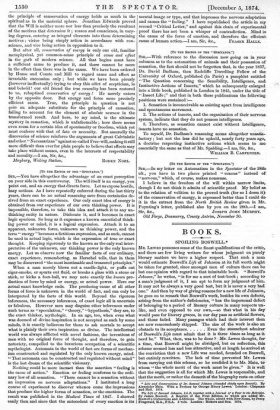[TO TEE EDITOR OF THE ‘. SPBOTATOR:1 STR,—You have altogether
the advantage of an exact perception on your side in this controversy. The will itself is an energy, you point out, and an energy that directs force. Let us expose hostile, hazy notions. As I have repeatedly enforced during the last thirty years, there can be no actual reasoning save from certainties de- rived from an exact experience. Our only exact idea of energy is obtained from our experience of our own thinking power. It is impossible, therefore, to take this idea and attach it to any Un- thinking entity in nature. Dislocate it, and it becomes in exact logic spurious. So long as it expresses a known essential of think- ing power or mind, it is a logical expression. Attach it to an apparent, unknown force, unknown as thinking power, and the term" energy "becomes a fictitious expression, and as such, cannot be used in actual logic, which is the expression of true or exact thought. Keeping rigorously to the known as the only real inter- pretative of the unknown, our thinking power is the only known energy. Let us observe now the familiar facts of our ordinary, exact experience, remembering, as Herschel tells, that in them may be discovered "the most inestimable and treasured principles."
When a man merely blows out a candle-light, or puffs out cigar-smoke, or spurts out fluid, or breaks a glass with a stone or stick, or kicks a foot-ball, we may note exactly the known pro- duction of force by mind or energy, or actual power. Here our actual exact knowledge ends. The producing cause of all other forms of force is unknown in the world of fact, and can only be interpreted by the facts of this world. Beyond the rigorous inferences, the necessary inferences, of exact logic all is uncertain or fabulous, However men may disguise other inferences under such terms as "speculation," "theory," "hypothesis," they are, to the exact thinker, mythologic. In an age, too, when even what was deemed of divine inspiration is not accepted as such by some minds, it is exactly ludicrous for them to ask mortals to accept what is plainly their own inspiration as divine. The intellectual world was always afflicted with novel fashions, the inventions of men with no original force of thought, and therefore, to gain notoriety, compelled to the luxurious occupation of a scientific mythologist. Automata in the world of fact are forms of mechan- ism constructed and regulated by the only known energy, mind. "That automata can be constructed and regulated without mind" is the last dream of the scientific visionary.
Nothing could be more inexact than the assertion "feeling is the cause of action." Emotion or feeling conforms to the ordi- nary law of all sensation. "There cannot be a sensation without an impression on nervous adaptations." I instituted a long course of experiment to discover whence come the impressions that produce the higher forms of sensation, or the emotions. The result was published in the Medical Times of 1847. I showed easily then and since that the antecedent of every emotion is its mental image or type, and that impresses the nervous adaptation and causes the "feeling." I have republished the article in my second "Critical Letter," and against this chain of experimental proof there has not been a whisper of contradiction. Mind is the cause of the force of emotion, and therefore the efficient.
cause of human action.--I am, Sir, &c., FRASER HATT E


































 Previous page
Previous page